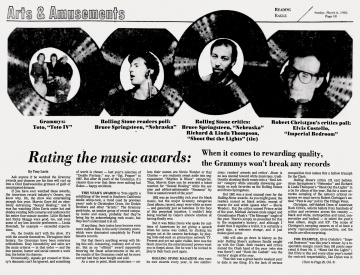|
Ask anyone if he watched the Grammy awards and chances are his face will curl up into a Clint Eastwood-like grimace of guilt or unmitigated distaste.
If you have ever watched these awards, the American record industry's Oscars, you know why. Oh, the show was entertaining enough this year. Marvin Gaye did an absolutely entrancing "Sexual Healing," and it was fun watching Miles Davis under hat and shades evading both cameras and audience for his entire four-minute number. Little Richard and Ricky Skaggs were good, too, and even some of my less favorite performers — Linda Ronstadt, for example — exceeded expectations.
No, the trouble isn't with the show. It's with the awards themselves. Throughout their history, the Grammys have been notorious schlockfests. Easy listenability and sales are the main criteria — in that order — and the less passion, humor and social content a work has, the better its chances.
Occasionally, signals get crossed or history's demands can't be ignored, and something of worth is chosen — last year's selection of Double Fantasy, say, or Sgt. Pepper in 1967. But after 25 years of the Grammys, it's clearer than ever that these were nothing but flukes — happy accidents.
This year's awards to Toto signify a solidifying of the trend to Southern California studio wimp-rock, a trend cued by previous years' nods to Christopher Cross, the Doobie Brothers and other "artists." The Grammy pooh-bahs, an insular group of record company hacks and execs, probably feel they're being hip by acknowledging rock music, but they don't understand it at all.
If anything, their tastes have become even more mellow than in the early Grammy years, which were dominated completely by Frank Sinatra records.
Not that there's anything wrong with liking this soft, reassuring, cushiony sort of music. But as an "official" award supposedly honoring the finest achievements in the art, the results of the Grammys could not be more corrupt had they been bought and sold.
As a case in point, black musicians — unless their names are Stevie Wonder or Ray Charles — are routinely swept aside into segregationist "Rhythm & Blues" categories. Thus, Marvin Gaye can be awarded a token. mention for "Sexual Healing while the asinine and all-but-unlistenable "Rosanna" by Toto is named record of the year!
1982 was an increthbly rich year for black music, but the major Grammy categories (best album, record, song) were white as snow — and generally just as tasteless. In the face of this perpetual injustice, I couldn't help being touched by Gaye's sincere emotion at having finally won.
But it was Miles Davis who spoke for millions of Americans by not giving a speech when his name was called, by sticking his tongue out at the camera backstage, by playing hide-and-seek on prime-time network TV. Present and yet not quite visible, here was the black America the entertainment powers want you to forget. about. Bet he won't be invited to play in their back yard again.
Rolling Stone magazine also runs its own awards every year, in two subdivisions) readers' awards and critics'. Stone is no less slanted toward white musicians, traditionally shunting black music into a "Soul Artist" category while annually showering garlands on such favorites as the Rolling Stones and Bruce Springsteen.
But 1982 was a most unusual year for the Rolling Stone awards. As you might guess, the readers named no black artists, except of course for soul artist (guess who? — Stevie Wonder). But the critics named Prince artist of the year, Michael Jackson male singer and Grandmaster Flash's "The Message" single of the year. There's simply no precedent for this in the magazine's history, and although I doubt that it signifies a trend, it is certainly a good sign, a welcome change, and it just makes good sense.
1982 will also go down in history as the year Rolling Stone's audience finally caught up with the Clash. Both readers and critics named the Clash band of the year who else was there?, and "Rock the Casbah" was the readers' single of the year.
to dTatt:Tiosn:.athiani.r=inedlsa‘ cykeacikfe :tdriZrs .co,trigeetg: cairsihthat makes this a hollow triumph
Rolling Stone's critics (22 cast ballots, chose Springsteen's Nebraska and Richard & Linda Thompson's Shoot Out the Lights in a tie for album of the year. But for a more accurate sampling of the nation's critical response we must turn to Robert Christgau's annual "Pazz & Jop" poll in The Village Voice.
Christgau, self-dubbed Dean of American Rock Critics, solicits ballots from hundreds of critics and reviewers across the country — black and white, metropolitan and rural, conservative and radical — to select the year's best album, single and EP. The scope of Christgau's sampling assures us of at least a pretty representative cross-section, and the results are often surprising.
For example, Elvis Costello's Imperial Bedroom was this year's winner by a respectable margin (more than 100 points separated it from No. 2, Shoot Out the Lights). But Elvis is this and every other year's model for rock-crit respectability, like Dylan was in the '60s — or like Sinatra has been for the Grammys.
Nebraska came in third, almost 200 points behind Costello, but it still seems a far more adventurous and satisfying album. The impressiveness of Costello's songwriting in certain instances can't be denied, but his
| 

